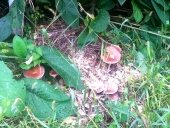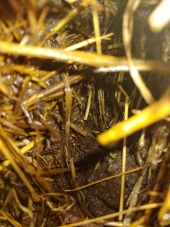




Permaculture and Homestead Blogging on the Traditional Catholic Homestead in Idaho! Jump to popular topics here: Propagating Morels!, Continuous Brew Kombucha!, and The Perfect Homestead Cow!




Dave Redvalley wrote: Would those mushrooms be Ok to eat or should they just be composted? I'm just a little concerned about the pesticide residue.




 2
2




“Let food be thy medicine and medicine be thy food.” - Hippocrates
 1
1




Zach Weiss wrote:
John, thank you for the wonderful explanation. I understand that fungi are very different from animals in that they digest compounds before accumulating them. If they are only ingesting compounds that they can use how is it that heavy metals, hydrocarbons, and radiation are accumulated in the fruiting bodies? Perhaps they are trying to purify their environment by removing these toxins? Why wouldn't there be the same risk for accumulation of herbicides and pesticides?




1. my projects
 1
1




Jeanine Gurley wrote:
Is there a way to 'detoxify' commercially grown hay or straw?









Permaculture and Homestead Blogging on the Traditional Catholic Homestead in Idaho! Jump to popular topics here: Propagating Morels!, Continuous Brew Kombucha!, and The Perfect Homestead Cow!




My Signature for the last few years was "just spinning wheels," but after our PDC at Pauls Place this summer I feel like we are finally catching traction. Hope to be threading some more. got a roof on our house, swales dug, and finally starting to work on our plan in more details.




Dave Redvalley wrote:Great information here guys, thanks for the feedback. It seems like the fungi will probably break down the herbicide residues, but I should set the straw aside for a season after I inoculate it to be on the safe side. Does this sound right?









Permaculture and Homestead Blogging on the Traditional Catholic Homestead in Idaho! Jump to popular topics here: Propagating Morels!, Continuous Brew Kombucha!, and The Perfect Homestead Cow!




My Signature for the last few years was "just spinning wheels," but after our PDC at Pauls Place this summer I feel like we are finally catching traction. Hope to be threading some more. got a roof on our house, swales dug, and finally starting to work on our plan in more details.

|
I brought this back from the farm where they grow the tiny ads:
2024 Permaculture Adventure Bundle
https://permies.com/w/bundle
|


